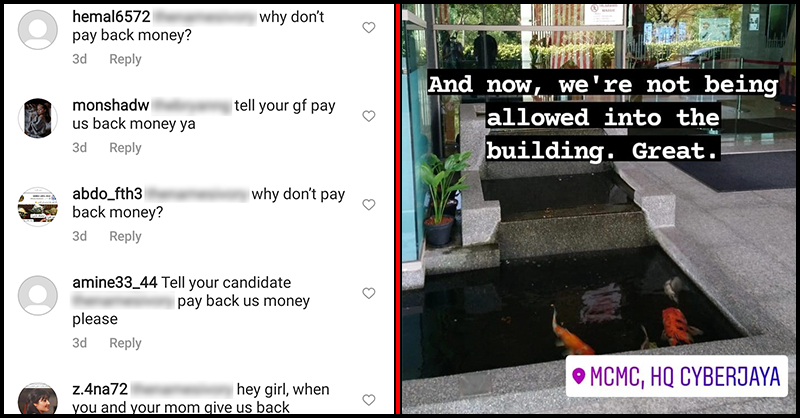Guess how much migrant workers pay to enter Malaysia
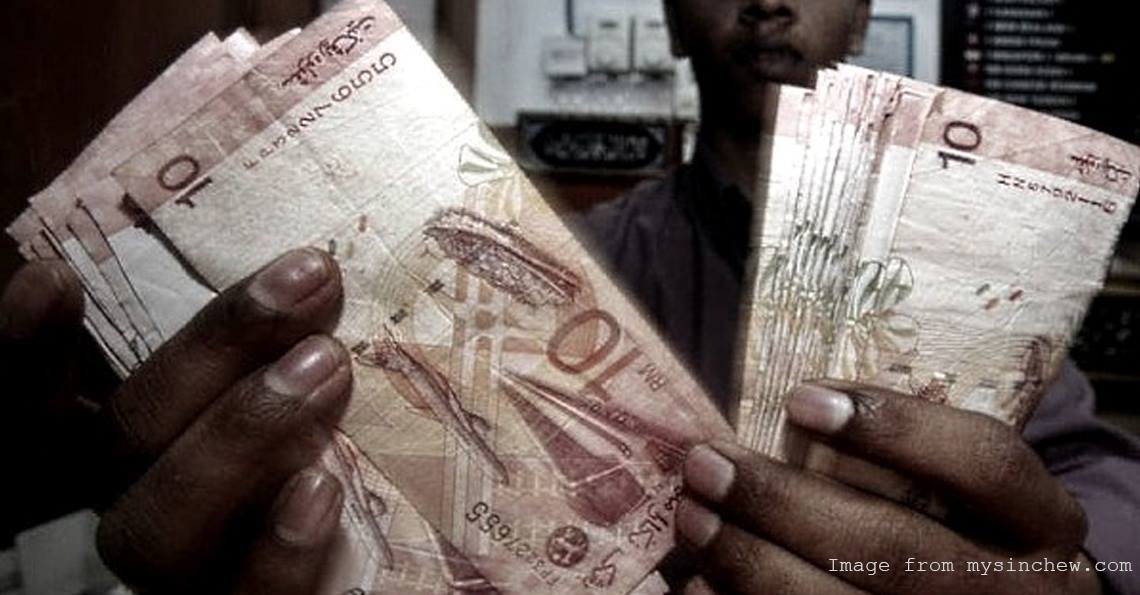
- 1.5KShares
- Facebook1.4K
- Twitter14
- LinkedIn14
- Email21
- WhatsApp42
Unless you’ve been living under Mount Everest, you’d know that the Nepal government has recently barred its citizens from seeking jobs in Malaysia. The Nepalese government wasn’t happy with the “restrictive” immigration requirements its workers faced before they can be allowed into Malaysia. This includes having to go through a private company for security and medical check-ups as part of the visa requirement.
Their point was, why is the Malaysian gomen letting a private company do the immigration department’s jobs? The matter is still under negotiations and our Human Resource Minister, M.Kulasegaran is trying to work out solutions, but we got to summore digging and found out that another concern raised by Nepalese NGOs was the widespread exploitation of migrant workers in Malaysia.
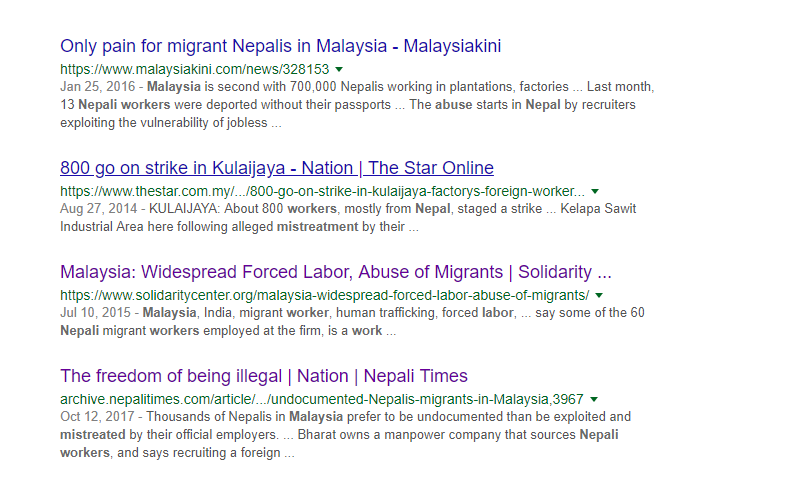
The latest report by the US State Department states that Malaysia fails to meet minimum standards in curbing human trafficking, with Kepong MP Lim Lip Eng saying many of the illegal foreign workers in Malaysia are victims of human trafficking and fraud. However, that’s a story for another article- if you want to see the lives of undocumented workers, do check out R.AGE’s excellent Student-Trafficked coverage here.
As for today, we decided to ask experts and research about what can be done to improve the current conditions of DOCUMENTED migrant workers in Malaysia.
1. Tell workers they can lodge police report if their employer keeps their passports against their will
We spoke to some employers who told us that they hold their employees’ passports for two main reasons: they’re afraid the workers may lose the passports, and secondly, they’re afraid that the workers may run away. You see, employers need to spend a certain amount of money to bring in foreign workers. The paperwork itself can cost around RM3,000 (this doesn’t include agent fee that can easily be more than RM 10k per person). The employers are worried that if the passport is lost, they will have to go through the mafan process of renewing their passports and re-doing the work permits. One employer told us that they have i-KADs for migrant workers now so they don’t have to carry their passports along so it shouldn’t be a problem for employers to hold their workers’ passports.
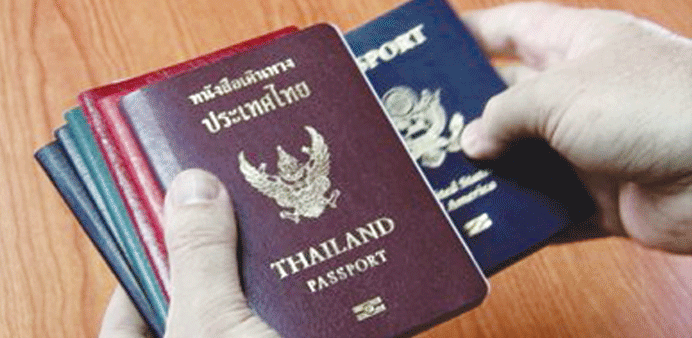
The second reason is the one that usually causes a lot of concern. Employers hold their workers’ passports because they don’t want the workers to run away. But what many may not know is that this is actually punishable by law. We have the Passports Act 1966 which states that the anyone holding a someone else’s passport could be fined RM10,000, or a jail term of up to 10 years, or both, upon conviction. Even our former minister of Home Affairs, Datuk Seri Dr Ahmad Zahid Hamidi stressed that withholding passports would not prevent workers from running away.
“If they run away, lodge a report with the police and Immigration Department and their visas will be cancelled. They will not be allowed into the country again,” Dr. Ahmad Zahid, The Star, 21 Dec 2014
However, we have been informed that people don’t usually get prosecuted solely for this offense. Usually this is added in with other charges, so if you abuse your maid and happen to have held her passport, then this will also be one of the crimes you will be tried for in court.
So, we asked a Tenaganita officer since it is illegal, why are these workers give their passports to their employers in the first place? She told us that they don’t think they have a choice. According to Elise Arya Chen, a programme and case officer at Tenaganita, most workers are either not informed or aware of their rights as migrants in Malaysia to know that they actually have the right to keep their passports instead of passing it to their employers or agents. In fact, sometimes they run away because they don’t have their passports on them.
“Whenever there was news of impending raids, most of the foreign workers, both legal and illegal, would flee the work sites to avoid arrest as their documents were kept by employers for safekeeping.” – Tee, Master Builder’s Association Malaysia president, The Star, 2014
“We have come across certain cases where the work permits are not processed in time or at all by agents or employers. That also affects the workers’ documentation despite them having paid everything and gone according to the proper process. 90% of the 5-6 million migrant workers in Malaysia come in with proper documentation.” Elise Arya Chen, Programme Officer at Tenaganita
Tenaganita says that the laws are already in place but they just aren’t enforced. They also suggest government regulated pre-departure and post-arrival briefings be arranged for migrant workers to educate them on their rights and familiarise them with the emergency numbers and other laws in order to prevent them from being exploited. If the government wants to outsource these briefings, outsourcing to NGOs instead of private companies would be much better.
2. Include all migrant workers in a housing law
Y’all may remember that a while ago R.AGE released a video titled ‘A Night in a Kongsi‘ which showed the kind of accommodations (known as kongsi) construction workers are having to stay in. The workers living there themselves describe the conditions to be “worse than the garbage dumps in the slums of Bangladesh”. However, it’s important to note that these were illegal workers, who are not covered by any laws.
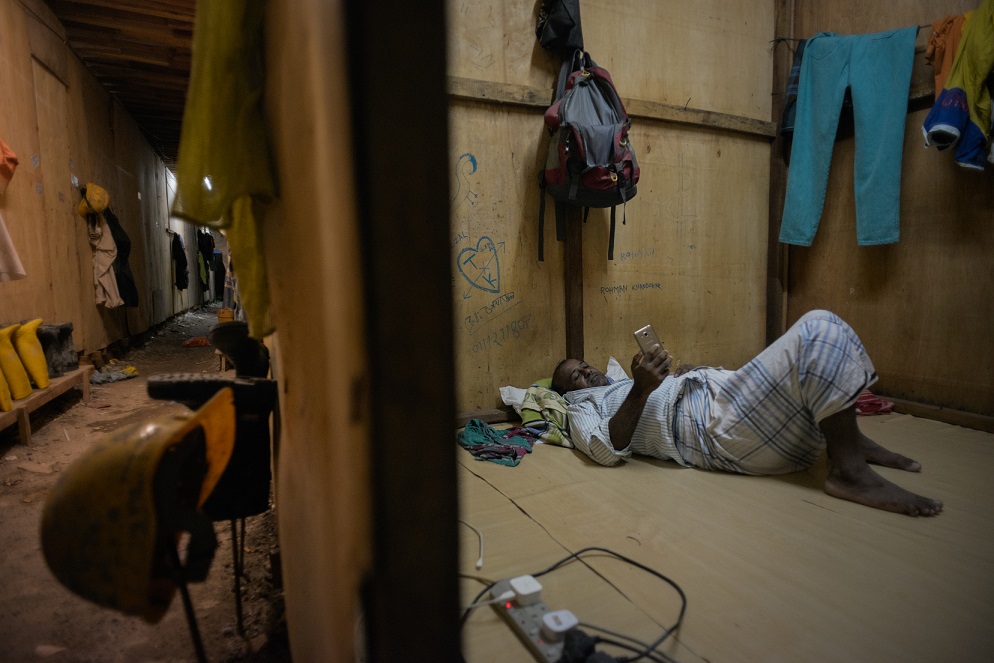
What about legal migrants? We found out that there is the Workers Minimum Standards Of Housing And Amenities Act (Act 446) that sets some standards of housing that the employer provides for the workers. Buuut… The law only applies to mining and plantation sectors. As for security construction, or any other… we can’t find any laws. Contractors want to save as much money as possible which is why they resort to providing housing that fulfills just basic health and sanitation laws, which is an extremely low standard of living.
Elise Arya Chen from Tenaganita says she has come across quite a number of stories where apartments are often overcrowded with 10-11 documented workers being crammed into a small apartment. She tells us that at Tenaganita, when they try to deal with these labour rights violation cases, it is often hard to bring them to the Labour department as they are not as proactive when dealing with migrant workers compared to cases of local workers, you can see a lot of difference. Well, there isn’t even a law on this at the moment, so….
3. Removing the middlemen
We found that some workers pay around RM18,000 to RM20,000 each JUST TO ENTER Malaysia in order to get jobs.

Not only that, according to NGOs, migrant workers end up becoming “undocumented” after falling victim to scams or being cheated by agents or employers.
“Migrant workers enter the country with valid documents. But instead of getting themselves documented, they end up becoming subjects of human trafficking,” said Tenaganita executive director Glorene A Das, Free Malaysia Today, July 15, 2018.
But if the actual paperwork only costs around RM 3,000, where does the remaining money go?
AGENTS. Some agents just tell these workers which office to go to and some private agents get their paperwork for them. An employer that we spoke to told us that the Indonesian private agents charge around RM 10,000 just to find a worker for the employer. But more often than not, the workers are made to bear the cost. How do they source for such a huge amount? They sell their lands or borrow money to pay the agents.
“Many land in Malaysia to find the agent gone, and no job as promised. With no money to return, broken dreams and little hope, they take up work in Malaysia illegally,” Kepong MP Lim Lip Eng, MalaysiaKini, 3 Jul 2018.
Tenaganita says their main focus is to get rid of agents as they are the ones largely responsible for the exploitation of the foreign workers. Tenaganita strongly supports a government-to-government recruitment system that eliminates the need for agents. Tenaganita’s executive director, Glorene A Das said that not only do these agencies leverage on loopholes to widen the surplus value of labour, their focus on profit created opportunities for corruption among enforcement authorities.
” The study finds that policy failures are basically built on ad-hoc management of in-migration, lack of enforcement of existing regulations and abusive practices of various stakeholders. Likewise, work and provision of basic rights for migrants under specific laws are found to be somewhat discriminative and arbitrary. Hence, the immediate challenge for policymakers is to ensure effective management of migrant workers, beginning with a clear policy on recruitment, placement, monitoring, and finally the return of migrant workers to their homeland.” – Policies and Laws Regulating Migrant Workers in Malaysia: A Critical Appraisal, Universiti Malaya
Another issue raised was that the policies that keep changing. Y’all may remember recently when our newly appointed Human Resource Minister M.Kulasegaran said that he wanted to ban foreign cooks from cooking in Malaysian restaurants. He later said that the issue was still under consideration.
Imagine being a foreign worker who doesn’t understand how our country works. Evidently, the news of the ban would be worrying. And who does he consult to clear his doubts?
“We need to ensure the consistency of policies and so that there is less confusion among foreign workers which will result in lesser dependency on agents to get the job done”-Elroi Yee, R.AGE
4. More employee accountability
The migrant workforce is essential to the construction, manufacturing, and agricultural industries which collectively contributes 35.7% to Malaysia’s gross domestic product. This means that migrants are a major part of the country’s economy. The Nepalese embassy in 2015 reported that 461 Nepalese workers had died in Malaysia, which is an increment of 32% from the previous year. That’s about 9 deaths per week. Malaysia is said to be becoming a death camp for migrant workers.
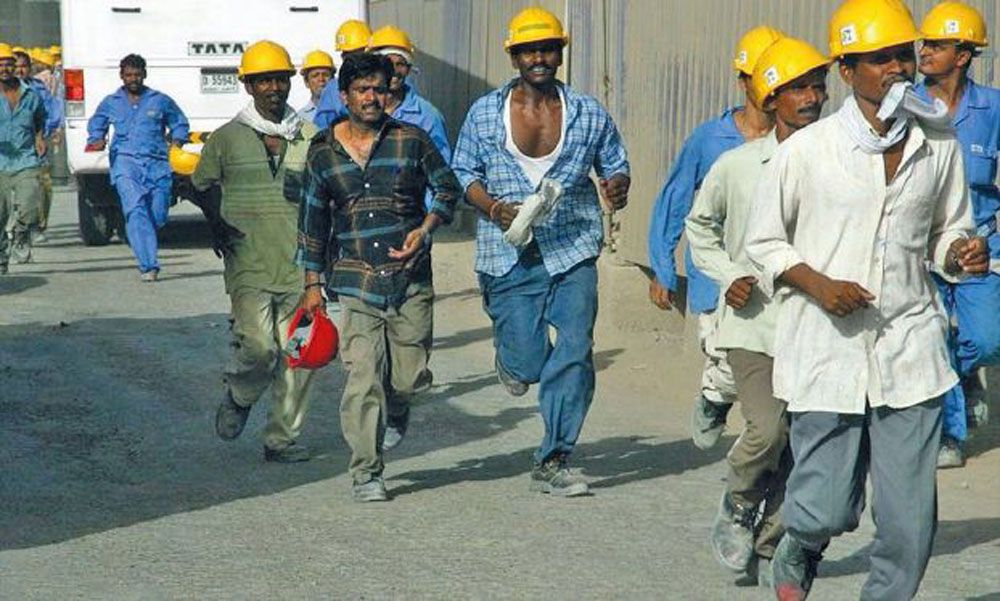
We came across some instances of employers who did not want to pay for their workers’ medical expenses, forcing the friends to go around, collecting funds from other migrant workers. According to these guys, it is pretty normal for them to collect medical funds like this because employers almost never pay. In this example, the worker was fully documented, with a valid work permit. His employer was also registered in the immigration department. So why was this guy not paying? By law, the employer should already have a medical insurance for the worker before he/she comes into the country. Turns out, the employer that was registered on the permit and the one actually employing him were two different companies.
“…the government must not deprive basic medical care for migrant workers, the main workforce that builds the country. An assessment must be immediately initiated to determine feasible schemes to finance and facilitate the medical care of migrant workers.”- FMT, June 24, 2016.
5. A migrant worker hotline, given to every legal worker
There was a report by Kathmandu Post a while back on the amount of harassment migrant workers face in Malaysia. The local police are reportedly notorious for causing trouble for these workers who are just trying to get by. Apparently people who are properly documented are harassed just as equally as the undocumented ones.
“The Nepali Embassy in Malaysia is aware of the police harassment Nepali migrant workers face. So is the Malaysian government. Time and again, the embassy has written official letters to the Home Ministry of Malaysia (under which is the Immigration Department), asking it to look into the matter of passport seizure and problems such as the police harassment. So far, the Nepali Embassy has had no answers other than assurances.”- Kathmandu Post, 2015-03-28

The employer that we spoke to also told us that his employees are constantly subjected to harassment by the police. At times the police even refuse to recognise the workers’ i-KADs and continues harassing them. But here’s what is interesting… Even the former IGP Khalid Abu Bakar has said that the police are NOT allowed to conduct random checks on immigrants.
Elise suggests that one way to curb the problem would be to set up 24-hour migrant worker hotlines that workers can call should they be harassed by the police. Actually, Tenaganita already has similar hotlines set up (+6012 335 0512 and +6012 339 5350) where they advise migrant workers on their rights. Unfortunately, we couldn’t find a country that has government set migrant hotlines but hey, there’s a first for everything right?
“The hotline could help to root out corruption in enforcement authorities. To ensure that the police, immigration and RELA don’t abuse their power when it comes to immigration crackdowns. It will definitely require a lot of brainstorming to ensure this is an efficient system since this has never been implemented elsewhere. We should be wary that it will have to be a very well-thought out system.”- Elise Arya Chen, Programme Officer at Tenaganita.
Tenaganita director, Aegile Fernandez has previously also made similar statements urging immigrants to look to Suhakam as one of the avenues to make their reports.
None of this works unless people believe in basic human rights
“Who would want to leave home and work so far away, if not for a better life for your wife and children?” Suresh Prasad Shah, Migrant Worker, Al Jazeera, 6 Feb 2018.
All in all, we can establish that the laws to protect the rights of these foreign workers are already in place but they need to be enforced properly, and made aware to migrant workers.
Side Note: We actually collaborated with Tenaganita and came up with a SHAREABLE INFOGRAPHIC to raise awareness. Do circulate it to any migrant workers you might know
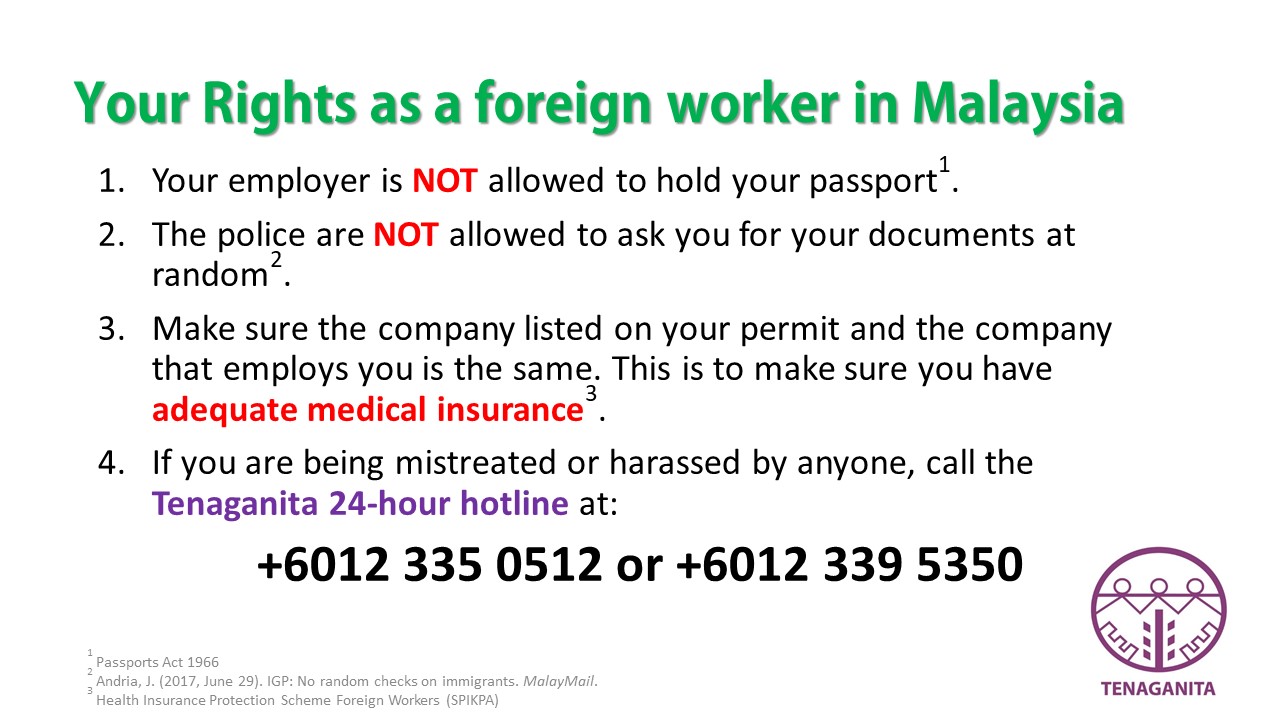
“Discrimination happens because of ineffective enforcement of the law and abuse of power. (contrary to popular belief) Migrant workers are not major contributors to the crime rates in Malaysia. Malaysia should introduce comprehensive migration laws and strengthen the monitoring of recruitment agencies.”- Discrimination Against Migrant Workers In Malaysia, Law faculty of Universiti Utara Malaysia.
And this needs to come from all directions, not just enforcement, but in people on the street. Malaysia needs to understand is that these migrant workers are human beings, contributing to OUR economy, doing jobs we don’t want to.
With strong shelling coming from Nepal at the moment, Malaysia has been put under the spotlight again. Many are hopeful that the new government will take action in order to curb this issue. However, the issue is by all means not just a local one, with the Qatar government recently coming under fire for migrant worker ‘slaves’ building the infrastructure for World Cup 2022. But in the spirit of #MalaysiaBaru, we have an opportunity to be better than that.
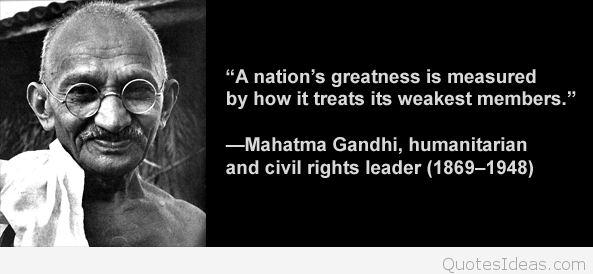
- 1.5KShares
- Facebook1.4K
- Twitter14
- LinkedIn14
- Email21
- WhatsApp42


